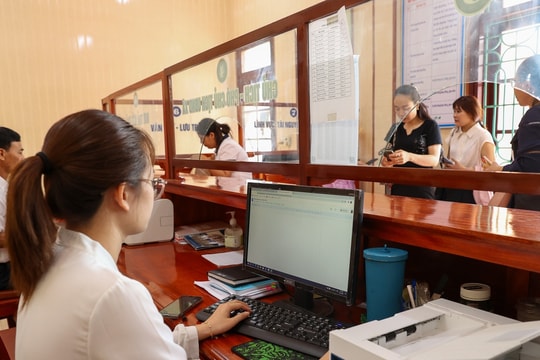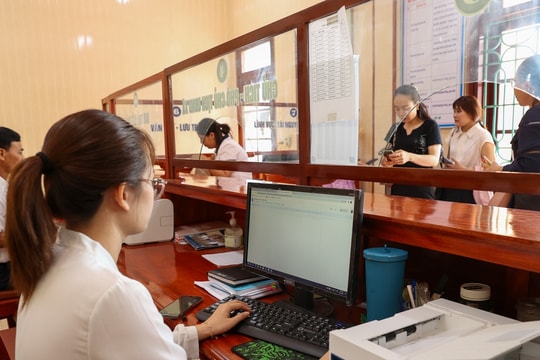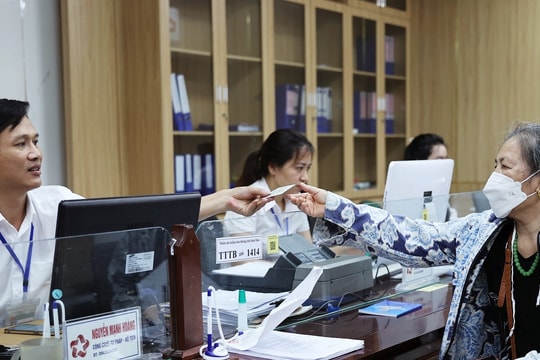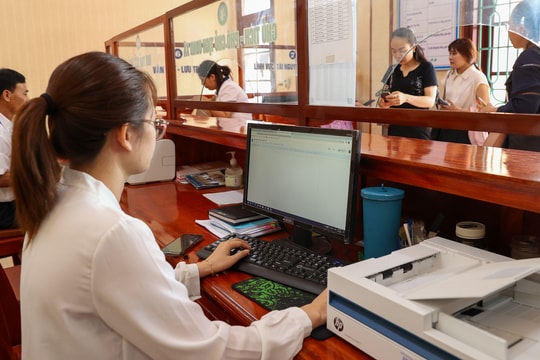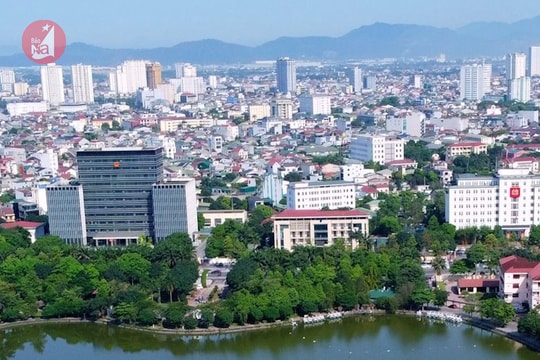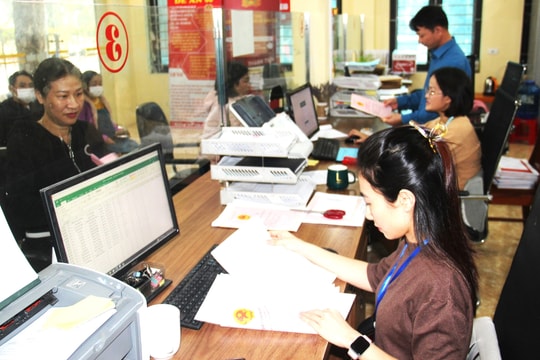What is the effective solution to streamline staffing?
If we do not restructure the organization and the staff, we cannot streamline the payroll.
No mechanical reduction
Implementing Resolution No. 39 of the Politburo on streamlining the payroll, Hanoi city set a target of reducing at least 10% by 2020, completing one year ahead of schedule. The goal is to streamline the payroll in parallel with improving the quality of public service performance. Up to now, agencies and units have basically completed the organization arrangement, reduced the number of focal points; continue to complete the job position project as a basis for streamlining the payroll...
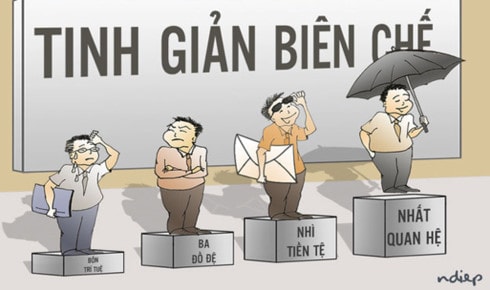 |
| Illustration photo. |
Accordingly, the Hanoi Party Committee has merged 2 Party Committees: Enterprises and Tourism; 7 districts no longer have Farmers' Associations; 20 Party and mass organization units have been consolidated; 69 Project Management Boards from the city to districts have also been reduced to 27 boards...
After the reorganization and consolidation, Hanoi city has reduced 59 departments and offices; 39 department heads and 143 corresponding deputy heads of departments and offices; reduced 130 public service units under the Department, 27 Project Management Boards, 2 funds and correspondingly reduced 30 head positions and 69 deputy positions. It is expected that when completed, at the district level, there will be a further reduction of 128 unit units.
Mr. Vu Duc Bao, Head of the Hanoi Party Committee's Organization Committee, said: Hanoi's experience is not to reduce mechanically but to reduce redundant places, people with weak capacity, merge units with similar functions and tasks; increase for places lacking based on the approved job position framework, and at the same time support the transfer of public service units to the autonomous and self-responsible mechanism. Reality shows that in the process of organizing and implementing, these units have promoted a lot of efficiency. Financial autonomy, budget autonomy, payroll autonomy and the state no longer has to subsidize.
“With this experience, in 2017, Hanoi has a policy of expanding units and fields. The spirit will be to focus on subsidizing only administrative and state management units. As for the remaining units that can be socialized and can create autonomy, we will focus on directing how to do this. This is the key to streamlining the payroll and the number of civil servants and public employees streamlined in this field will be large, fast and effective,” said Mr. Vu Duc Bao.
Practices and methods in Hanoi show that streamlining the payroll must be associated with reducing the number of focal points. It is necessary to restructure the staff, civil servants and public employees, not simply reduce the number of people working in agencies. In combination with streamlining the payroll, ministries, branches and localities must develop a project to streamline the payroll from now until 2021 and have a specific plan every year according to the roadmap for streamlining.
On that basis, units and localities that have not achieved the prescribed rate of streamlining in the past must increase the rate of streamlining by 1.5-2% per year in the coming time, so that by 2021, the entire political system will have to streamline its staff to reach at least 10%. Avoid the situation where 86.25% of the streamlining subjects are cadres with only 2-3 years of work left before retirement, causing the streamlining policy to be misdirected.
National Assembly Representative Pham Khanh Phong Lan, National Assembly Delegation of Ho Chi Minh City, said that streamlining the payroll is a sensitive issue, related to the responsibilities and rights of more than 3,574,000 civil servants and public employees today. For this process to be effective, there needs to be synchronous coordination between all levels and sectors, creating motivation in work. That process cannot lack the impartiality, responsibility, and exemplary role of the head and agency leaders in evaluating and commenting on cadres.
According to delegate Pham Khanh Phong Lan, because of the quota issue, there is a phenomenon of "sweeping up the small pieces", everyone who retires is considered to be downsizing. Therefore, it is necessary to redefine tasks and work efficiency, increase work assignment, then income will increase, civil servants and public employees will balance themselves. At the same time, streamline from top to bottom to set an example, boldly implement the job position project.
In fact, the number of staff in the public service sector increased by 165,000 people from 2011 to 2016. However, in the process of implementing Resolution 39, a number of local public service units were reorganized in the direction of reducing the number of focal points. The human resources of the public service system were improved in terms of quantity, especially in education, training, vocational training and health care.
The staff of civil servants and public employees in public service units basically meet the requirements and assigned professional tasks and are gradually improving; public service units are autonomous in paying salaries and incomes, thereby attracting a highly qualified workforce. Therefore, the long-term solution is to promote socialization, reduce the number of people receiving salaries from the state budget, and create more jobs for social workers, which should be encouraged.
Streamlining the payroll must be associated with reducing the number of contacts.
Minister of Home Affairs Le Vinh Tan said that the Ministry is submitting to the Prime Minister a project to innovate management and financial mechanisms and reorganize the system of public service units.
In particular, promote decentralization in management and finance; propose to shift from fees to prices so that public service units can be financially autonomous; study to gradually eliminate subsidies for public service units; treat public service units and private service units equally to encourage competition. At the same time, there is a development planning orientation for public service units in the direction of planning standards and conditions for development and in the direction of the State gradually reducing expenditure for public service units, moving towards socialization and granting autonomy to public service units.
Recently, working with the Ministry of Home Affairs on this Project, Deputy Prime Minister Vuong Dinh Hue requested that the arrangement of the public service unit system should avoid dispersion, spread out, and overlap in order to drastically reduce the number of focal points, reduce the number of employees, and link the right to recruit with the use of labor.
“The viewpoint in innovating the operation of public service units must follow market principles, with the leading role of the State; thoroughly grasp the Party's policies and Resolutions. Encourage socialization, clear public-private distinction. Strengthen the division of labor and decentralization. Along with that, strengthen inspection, examination, and post-inspection. The common goal is to improve the quality of public services but also improve the lives of civil servants and workers in the public service sector, restructure budget revenue and expenditure to create a source for salary reform" - Deputy Prime Minister Vuong Dinh Hue emphasized.
Thus, streamlining the payroll must be associated with reducing the number of focal points. Without restructuring the organization and the staff, it will not be possible to streamline the payroll. The policy of innovating the management mechanism, financial mechanism, and reorganizing the system of public service units is very important. In addition, it also encourages socialization and gives autonomy to public service units.
In addition to such fundamental solutions, it is necessary to promote the role and responsibility of leaders in streamlining the payroll and using staff, or in other words, "using people" effectively must be considered a particularly important solution.
Leaders need to be given more authority in recruitment, and also take more responsibility if subordinates do not complete their tasks. Only then can we effectively implement the major policy of the Party and State of streamlining the payroll and improving the quality of cadres and civil servants, which is an important factor for the country's economy to develop stably and sustainably./.
According to VOV

